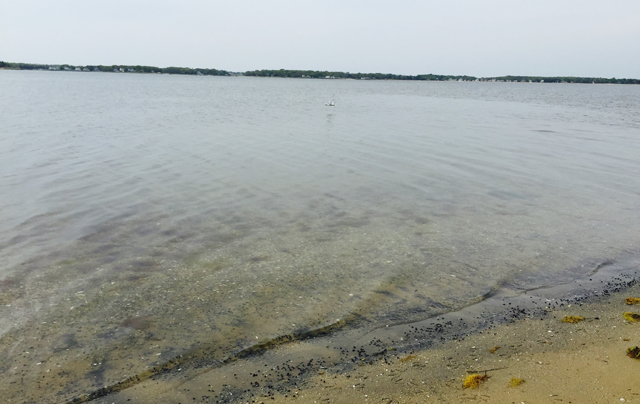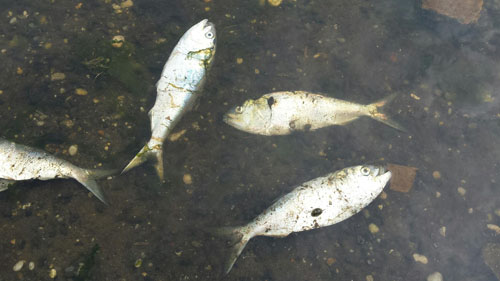DEC says red tide biotoxins likely caused turtle die-off

Update Monday 2:30 p.m.: A state pathology lab investigating the die-off of dozens of turtles in Peconic Bay has found marine biotoxins are likely the cause.
Though findings from a necropsy were “nonspecific” — meaning the turtle’s death could not be directly cited to the presence of the red tide byproduct saxitoxin — testing on the contents of the turtle’s intestines was inconclusive but revealed that saxitoxin may have been present, the state Department of Environmental Conservation said.
“Circumstantial evidence is consistent with the terrapins being poisoned with saxitoxin,” said state spokesperson Lori Severino. “If additional terrapin carcasses are found, [the] DEC will test them as well in an effort to confirm the cause of deaths in this terrapin die-off.”
Turtle Rescue of the Hamptons executive director Karen Testa had told the News-Review the group was hoping the turtles had been killed because of the harsh winter and not the toxin. She said the poisoned turtles may have been just coming out of hibernation when they ate the toxic shellfish.
“What that does is it paralyzes them and they would just drown. It’s a horrible death, “she said. “They get their first meal and its poison. It’s horrible.”
Original story: Flanders Bay and western Shinnecock Bay have been added to the list of local waterbodies where the harvesting of shellfish is temporarily prohibited due to unusually high toxin levels, the New York Department of Environmental Conservation announced Saturday.
Three area creeks were also shut down by the state in the last two weeks.
RELATED: STATE DEC SHUTS DOWN SHELLFISHING AGAIN, NOW IN JAMES CREEK
In a press release, DEC officials said the newest closures impact the tributaries of Riverhead Town’s Flanders Bay and all of of western Shinnecock Bay in Southampton Town. Shellfish collected May 15 from these locations tested positive for saxitoxin, a marine biotoxin that causes paralytic shellfish poisoning, officials said. The toxin can be harmful to humans and animals if ingested.
“It’s a microscopic organism that grows in the water and this is the time of year we usually see it,” said Christopher Gobler, associate dean of research of Stony Brook University’s School of Marine and Atmospheric Sciences.
Mr. Gobler’s team led the May 15 research.
“It’s most common in areas that have high levels of nitrogen in the water and slow flushing rates,” he said.
In addition to the latest closures, the DEC said it has discovered many dead terrapin turtles throughout Flanders Bay that are suspected to have died after eating contaminated mollusks. Mr. Gobler said Stony Brook University students counted at least 50 dead terrapin turtles alone at Iron Point Park in Flanders on Friday. He also said several thousand bunker and blue fish in the Peconic River near Flanders recently died, possibly due to low oxygen levels.
“It’s disconcerting,” Mr. Gobler said. “In one week we have toxic shellfish, dying turtles and dying fish all in the same general region.”

Contact with water in and around the areas currently closed to shellfishing isn’t expected to cause any problems, DEC officials said, but residents are urged to avoid contact with water that appears discolored. If contact does occur, it should immediately be rinsed off with clean water, they said.
According to officials, symptoms of saxitoxin poisoning depend on the amount ingested and can progress “from tingling of the lips and tongue, to numbness of the face, neck and limbs, loss of muscular control, followed by difficulty breathing.”
The DEC said full quantitative results from affected waterbodies will be available next week. For the most up-to-date lists of waterbodies affected by marine toxins, click here.
With Paul Squire.








